Reflective Journal: Public Speaking, Teamwork, Feedback - Semester 1
VerifiedAdded on 2021/07/20
|21
|5008
|50
Homework Assignment
AI Summary
This reflective journal delves into key aspects of business psychology, including public speaking, teamwork, and the giving and receiving of feedback. The introduction provides a foundational overview of business psychology, its methods, and its relevance in understanding individual and group behaviors within organizations. The journal then progresses into individual reflective entries, analyzing the core skills of public speaking and teamwork, supported by relevant theories and personal assessments using various tools and feedback. The analysis includes self-assessment quizzes, peer and tutor feedback, and personal reflections on strengths, weaknesses, and areas for improvement. The final section synthesizes the insights gained, offering a personal development plan to enhance these skills. References and appendices, including quizzes and feedback, are included to support the analysis and findings, providing a comprehensive understanding of the student's self-assessment and growth in these crucial business skills.
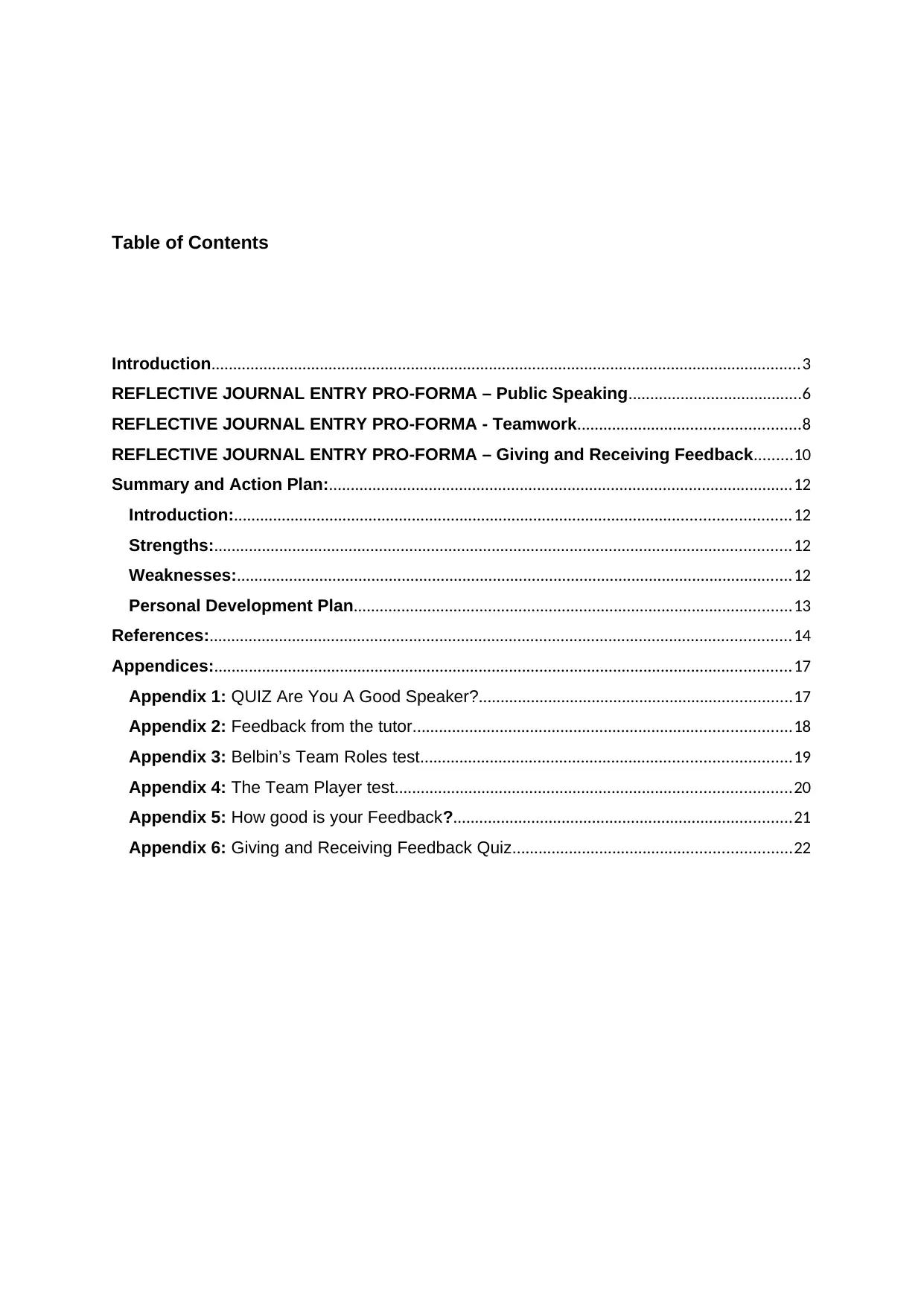
Table of Contents
Introduction........................................................................................................................................3
REFLECTIVE JOURNAL ENTRY PRO-FORMA – Public Speaking........................................6
REFLECTIVE JOURNAL ENTRY PRO-FORMA - Teamwork...................................................8
REFLECTIVE JOURNAL ENTRY PRO-FORMA – Giving and Receiving Feedback.........10
Summary and Action Plan:...........................................................................................................12
Introduction:................................................................................................................................12
Strengths:.....................................................................................................................................12
Weaknesses:................................................................................................................................12
Personal Development Plan.....................................................................................................13
References:......................................................................................................................................14
Appendices:.....................................................................................................................................17
Appendix 1: QUIZ Are You A Good Speaker?........................................................................17
Appendix 2: Feedback from the tutor.......................................................................................18
Appendix 3: Belbin’s Team Roles test.....................................................................................19
Appendix 4: The Team Player test...........................................................................................20
Appendix 5: How good is your Feedback?..............................................................................21
Appendix 6: Giving and Receiving Feedback Quiz................................................................22
Introduction........................................................................................................................................3
REFLECTIVE JOURNAL ENTRY PRO-FORMA – Public Speaking........................................6
REFLECTIVE JOURNAL ENTRY PRO-FORMA - Teamwork...................................................8
REFLECTIVE JOURNAL ENTRY PRO-FORMA – Giving and Receiving Feedback.........10
Summary and Action Plan:...........................................................................................................12
Introduction:................................................................................................................................12
Strengths:.....................................................................................................................................12
Weaknesses:................................................................................................................................12
Personal Development Plan.....................................................................................................13
References:......................................................................................................................................14
Appendices:.....................................................................................................................................17
Appendix 1: QUIZ Are You A Good Speaker?........................................................................17
Appendix 2: Feedback from the tutor.......................................................................................18
Appendix 3: Belbin’s Team Roles test.....................................................................................19
Appendix 4: The Team Player test...........................................................................................20
Appendix 5: How good is your Feedback?..............................................................................21
Appendix 6: Giving and Receiving Feedback Quiz................................................................22
Paraphrase This Document
Need a fresh take? Get an instant paraphrase of this document with our AI Paraphraser
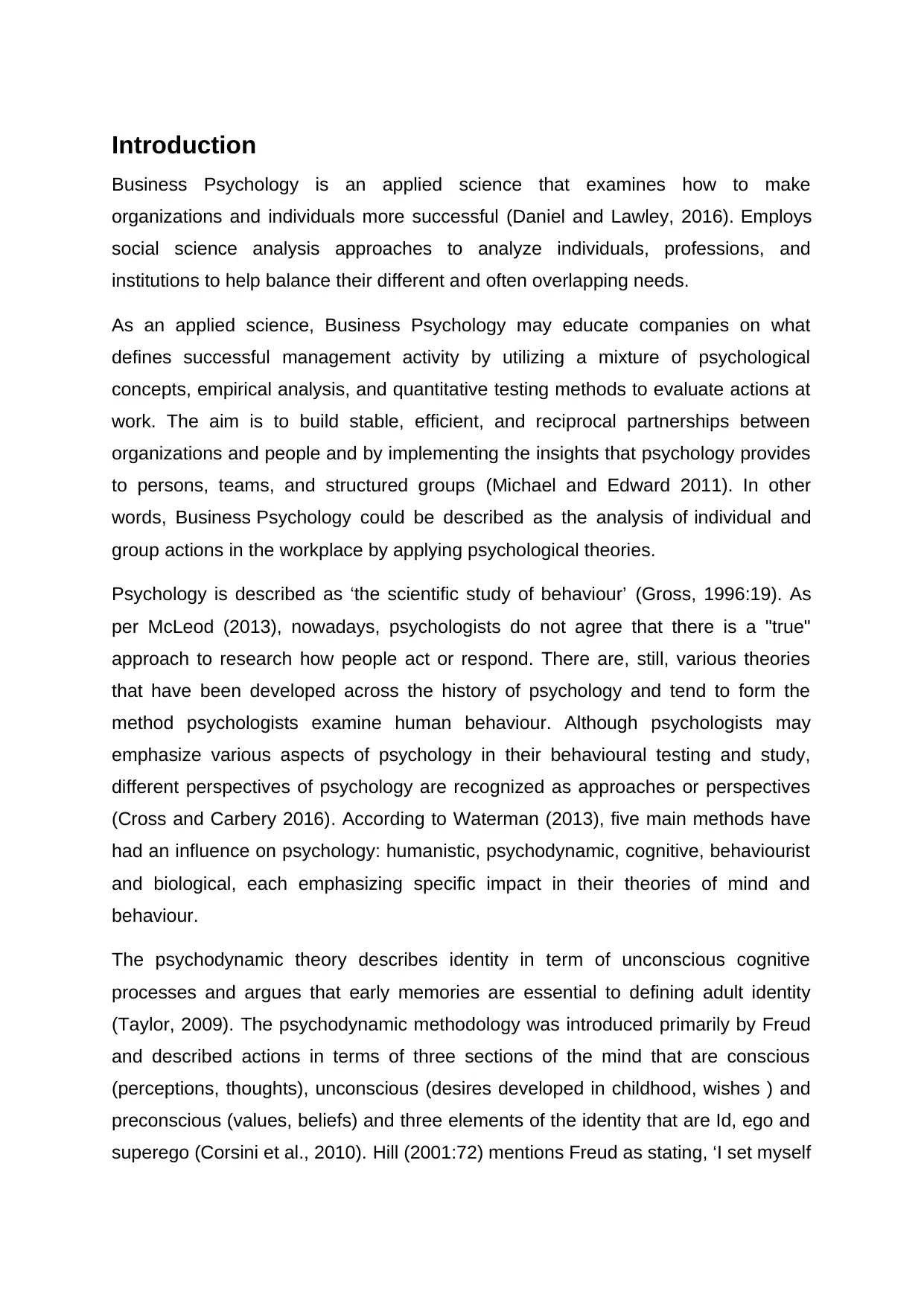
Introduction
Business Psychology is an applied science that examines how to make
organizations and individuals more successful (Daniel and Lawley, 2016). Employs
social science analysis approaches to analyze individuals, professions, and
institutions to help balance their different and often overlapping needs.
As an applied science, Business Psychology may educate companies on what
defines successful management activity by utilizing a mixture of psychological
concepts, empirical analysis, and quantitative testing methods to evaluate actions at
work. The aim is to build stable, efficient, and reciprocal partnerships between
organizations and people and by implementing the insights that psychology provides
to persons, teams, and structured groups (Michael and Edward 2011). In other
words, Business Psychology could be described as the analysis of individual and
group actions in the workplace by applying psychological theories.
Psychology is described as ‘the scientific study of behaviour’ (Gross, 1996:19). As
per McLeod (2013), nowadays, psychologists do not agree that there is a "true"
approach to research how people act or respond. There are, still, various theories
that have been developed across the history of psychology and tend to form the
method psychologists examine human behaviour. Although psychologists may
emphasize various aspects of psychology in their behavioural testing and study,
different perspectives of psychology are recognized as approaches or perspectives
(Cross and Carbery 2016). According to Waterman (2013), five main methods have
had an influence on psychology: humanistic, psychodynamic, cognitive, behaviourist
and biological, each emphasizing specific impact in their theories of mind and
behaviour.
The psychodynamic theory describes identity in term of unconscious cognitive
processes and argues that early memories are essential to defining adult identity
(Taylor, 2009). The psychodynamic methodology was introduced primarily by Freud
and described actions in terms of three sections of the mind that are conscious
(perceptions, thoughts), unconscious (desires developed in childhood, wishes ) and
preconscious (values, beliefs) and three elements of the identity that are Id, ego and
superego (Corsini et al., 2010). Hill (2001:72) mentions Freud as stating, ‘I set myself
Business Psychology is an applied science that examines how to make
organizations and individuals more successful (Daniel and Lawley, 2016). Employs
social science analysis approaches to analyze individuals, professions, and
institutions to help balance their different and often overlapping needs.
As an applied science, Business Psychology may educate companies on what
defines successful management activity by utilizing a mixture of psychological
concepts, empirical analysis, and quantitative testing methods to evaluate actions at
work. The aim is to build stable, efficient, and reciprocal partnerships between
organizations and people and by implementing the insights that psychology provides
to persons, teams, and structured groups (Michael and Edward 2011). In other
words, Business Psychology could be described as the analysis of individual and
group actions in the workplace by applying psychological theories.
Psychology is described as ‘the scientific study of behaviour’ (Gross, 1996:19). As
per McLeod (2013), nowadays, psychologists do not agree that there is a "true"
approach to research how people act or respond. There are, still, various theories
that have been developed across the history of psychology and tend to form the
method psychologists examine human behaviour. Although psychologists may
emphasize various aspects of psychology in their behavioural testing and study,
different perspectives of psychology are recognized as approaches or perspectives
(Cross and Carbery 2016). According to Waterman (2013), five main methods have
had an influence on psychology: humanistic, psychodynamic, cognitive, behaviourist
and biological, each emphasizing specific impact in their theories of mind and
behaviour.
The psychodynamic theory describes identity in term of unconscious cognitive
processes and argues that early memories are essential to defining adult identity
(Taylor, 2009). The psychodynamic methodology was introduced primarily by Freud
and described actions in terms of three sections of the mind that are conscious
(perceptions, thoughts), unconscious (desires developed in childhood, wishes ) and
preconscious (values, beliefs) and three elements of the identity that are Id, ego and
superego (Corsini et al., 2010). Hill (2001:72) mentions Freud as stating, ‘I set myself
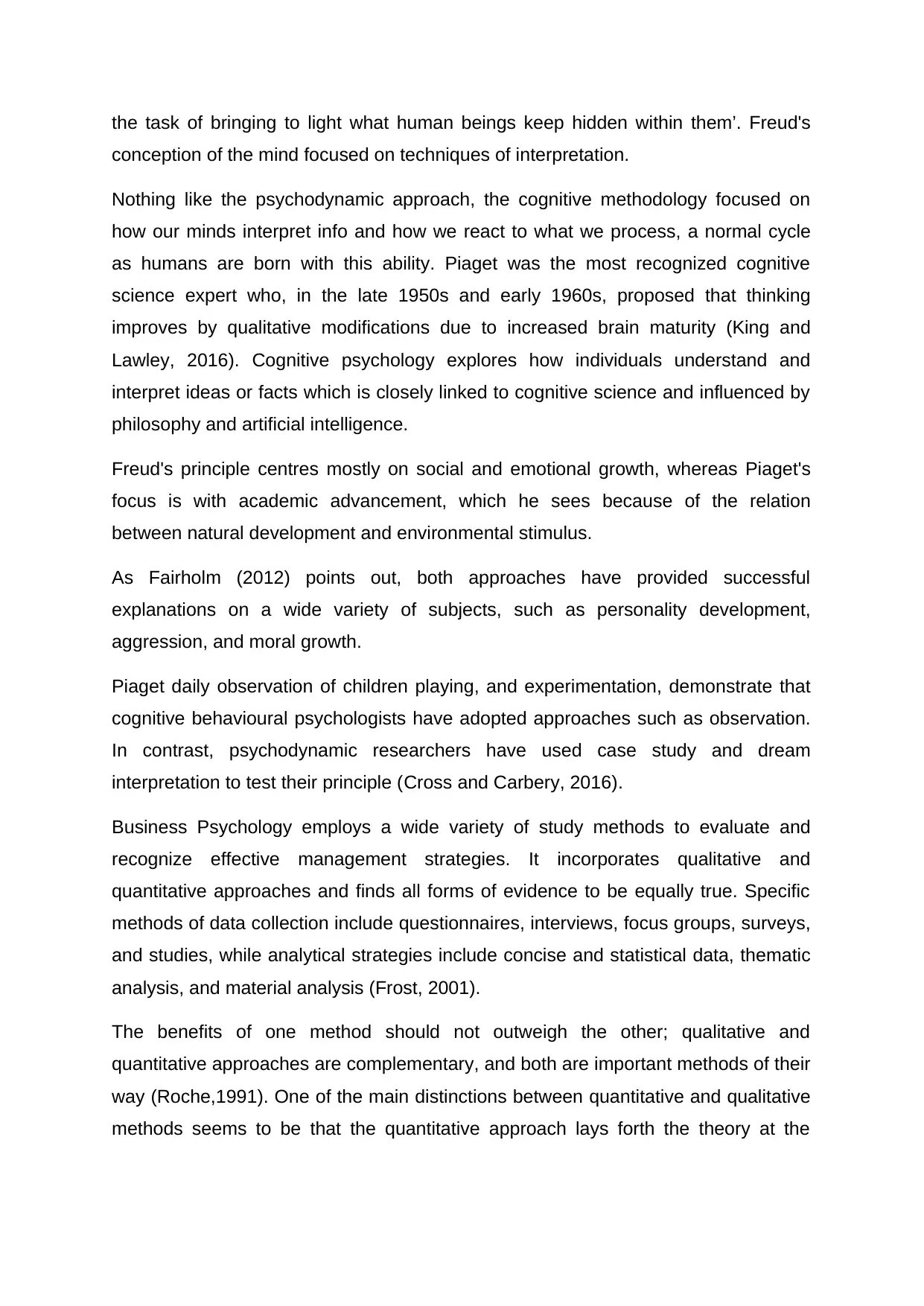
the task of bringing to light what human beings keep hidden within them’. Freud's
conception of the mind focused on techniques of interpretation.
Nothing like the psychodynamic approach, the cognitive methodology focused on
how our minds interpret info and how we react to what we process, a normal cycle
as humans are born with this ability. Piaget was the most recognized cognitive
science expert who, in the late 1950s and early 1960s, proposed that thinking
improves by qualitative modifications due to increased brain maturity (King and
Lawley, 2016). Cognitive psychology explores how individuals understand and
interpret ideas or facts which is closely linked to cognitive science and influenced by
philosophy and artificial intelligence.
Freud's principle centres mostly on social and emotional growth, whereas Piaget's
focus is with academic advancement, which he sees because of the relation
between natural development and environmental stimulus.
As Fairholm (2012) points out, both approaches have provided successful
explanations on a wide variety of subjects, such as personality development,
aggression, and moral growth.
Piaget daily observation of children playing, and experimentation, demonstrate that
cognitive behavioural psychologists have adopted approaches such as observation.
In contrast, psychodynamic researchers have used case study and dream
interpretation to test their principle (Cross and Carbery, 2016).
Business Psychology employs a wide variety of study methods to evaluate and
recognize effective management strategies. It incorporates qualitative and
quantitative approaches and finds all forms of evidence to be equally true. Specific
methods of data collection include questionnaires, interviews, focus groups, surveys,
and studies, while analytical strategies include concise and statistical data, thematic
analysis, and material analysis (Frost, 2001).
The benefits of one method should not outweigh the other; qualitative and
quantitative approaches are complementary, and both are important methods of their
way (Roche,1991). One of the main distinctions between quantitative and qualitative
methods seems to be that the quantitative approach lays forth the theory at the
conception of the mind focused on techniques of interpretation.
Nothing like the psychodynamic approach, the cognitive methodology focused on
how our minds interpret info and how we react to what we process, a normal cycle
as humans are born with this ability. Piaget was the most recognized cognitive
science expert who, in the late 1950s and early 1960s, proposed that thinking
improves by qualitative modifications due to increased brain maturity (King and
Lawley, 2016). Cognitive psychology explores how individuals understand and
interpret ideas or facts which is closely linked to cognitive science and influenced by
philosophy and artificial intelligence.
Freud's principle centres mostly on social and emotional growth, whereas Piaget's
focus is with academic advancement, which he sees because of the relation
between natural development and environmental stimulus.
As Fairholm (2012) points out, both approaches have provided successful
explanations on a wide variety of subjects, such as personality development,
aggression, and moral growth.
Piaget daily observation of children playing, and experimentation, demonstrate that
cognitive behavioural psychologists have adopted approaches such as observation.
In contrast, psychodynamic researchers have used case study and dream
interpretation to test their principle (Cross and Carbery, 2016).
Business Psychology employs a wide variety of study methods to evaluate and
recognize effective management strategies. It incorporates qualitative and
quantitative approaches and finds all forms of evidence to be equally true. Specific
methods of data collection include questionnaires, interviews, focus groups, surveys,
and studies, while analytical strategies include concise and statistical data, thematic
analysis, and material analysis (Frost, 2001).
The benefits of one method should not outweigh the other; qualitative and
quantitative approaches are complementary, and both are important methods of their
way (Roche,1991). One of the main distinctions between quantitative and qualitative
methods seems to be that the quantitative approach lays forth the theory at the
⊘ This is a preview!⊘
Do you want full access?
Subscribe today to unlock all pages.

Trusted by 1+ million students worldwide
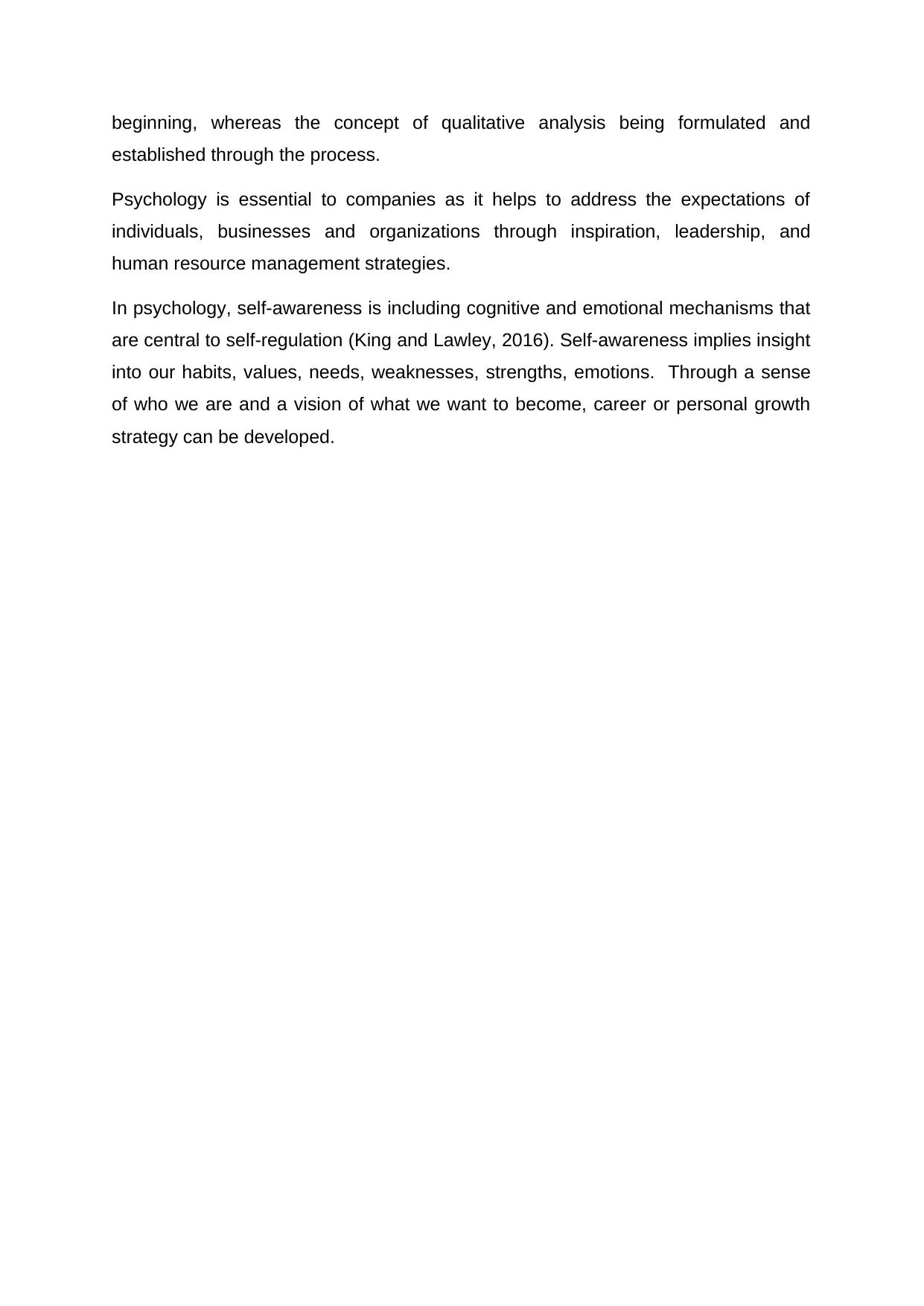
beginning, whereas the concept of qualitative analysis being formulated and
established through the process.
Psychology is essential to companies as it helps to address the expectations of
individuals, businesses and organizations through inspiration, leadership, and
human resource management strategies.
In psychology, self-awareness is including cognitive and emotional mechanisms that
are central to self-regulation (King and Lawley, 2016). Self-awareness implies insight
into our habits, values, needs, weaknesses, strengths, emotions. Through a sense
of who we are and a vision of what we want to become, career or personal growth
strategy can be developed.
established through the process.
Psychology is essential to companies as it helps to address the expectations of
individuals, businesses and organizations through inspiration, leadership, and
human resource management strategies.
In psychology, self-awareness is including cognitive and emotional mechanisms that
are central to self-regulation (King and Lawley, 2016). Self-awareness implies insight
into our habits, values, needs, weaknesses, strengths, emotions. Through a sense
of who we are and a vision of what we want to become, career or personal growth
strategy can be developed.
Paraphrase This Document
Need a fresh take? Get an instant paraphrase of this document with our AI Paraphraser
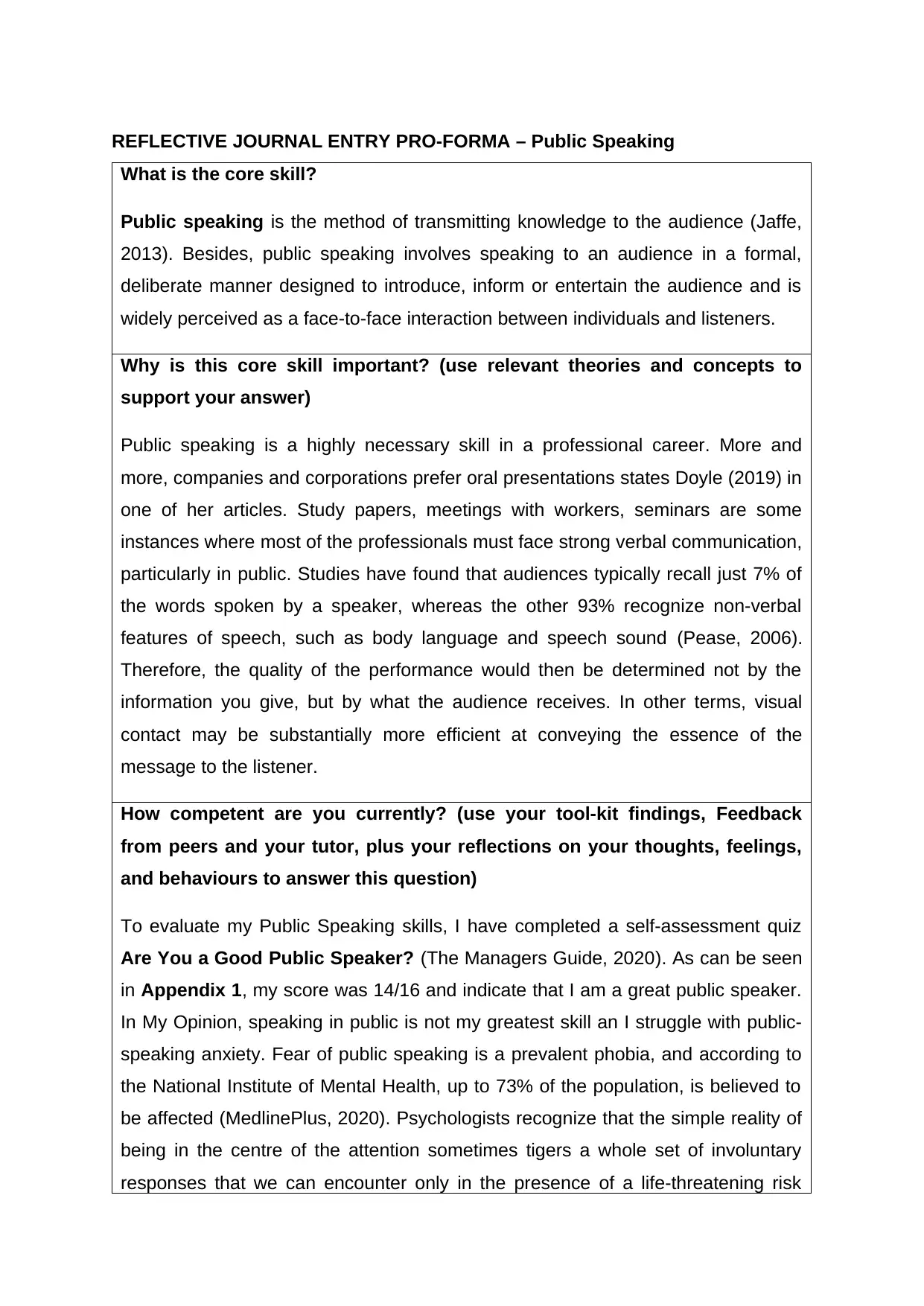
REFLECTIVE JOURNAL ENTRY PRO-FORMA – Public Speaking
What is the core skill?
Public speaking is the method of transmitting knowledge to the audience (Jaffe,
2013). Besides, public speaking involves speaking to an audience in a formal,
deliberate manner designed to introduce, inform or entertain the audience and is
widely perceived as a face-to-face interaction between individuals and listeners.
Why is this core skill important? (use relevant theories and concepts to
support your answer)
Public speaking is a highly necessary skill in a professional career. More and
more, companies and corporations prefer oral presentations states Doyle (2019) in
one of her articles. Study papers, meetings with workers, seminars are some
instances where most of the professionals must face strong verbal communication,
particularly in public. Studies have found that audiences typically recall just 7% of
the words spoken by a speaker, whereas the other 93% recognize non-verbal
features of speech, such as body language and speech sound (Pease, 2006).
Therefore, the quality of the performance would then be determined not by the
information you give, but by what the audience receives. In other terms, visual
contact may be substantially more efficient at conveying the essence of the
message to the listener.
How competent are you currently? (use your tool-kit findings, Feedback
from peers and your tutor, plus your reflections on your thoughts, feelings,
and behaviours to answer this question)
To evaluate my Public Speaking skills, I have completed a self-assessment quiz
Are You a Good Public Speaker? (The Managers Guide, 2020). As can be seen
in Appendix 1, my score was 14/16 and indicate that I am a great public speaker.
In My Opinion, speaking in public is not my greatest skill an I struggle with public-
speaking anxiety. Fear of public speaking is a prevalent phobia, and according to
the National Institute of Mental Health, up to 73% of the population, is believed to
be affected (MedlinePlus, 2020). Psychologists recognize that the simple reality of
being in the centre of the attention sometimes tigers a whole set of involuntary
responses that we can encounter only in the presence of a life-threatening risk
What is the core skill?
Public speaking is the method of transmitting knowledge to the audience (Jaffe,
2013). Besides, public speaking involves speaking to an audience in a formal,
deliberate manner designed to introduce, inform or entertain the audience and is
widely perceived as a face-to-face interaction between individuals and listeners.
Why is this core skill important? (use relevant theories and concepts to
support your answer)
Public speaking is a highly necessary skill in a professional career. More and
more, companies and corporations prefer oral presentations states Doyle (2019) in
one of her articles. Study papers, meetings with workers, seminars are some
instances where most of the professionals must face strong verbal communication,
particularly in public. Studies have found that audiences typically recall just 7% of
the words spoken by a speaker, whereas the other 93% recognize non-verbal
features of speech, such as body language and speech sound (Pease, 2006).
Therefore, the quality of the performance would then be determined not by the
information you give, but by what the audience receives. In other terms, visual
contact may be substantially more efficient at conveying the essence of the
message to the listener.
How competent are you currently? (use your tool-kit findings, Feedback
from peers and your tutor, plus your reflections on your thoughts, feelings,
and behaviours to answer this question)
To evaluate my Public Speaking skills, I have completed a self-assessment quiz
Are You a Good Public Speaker? (The Managers Guide, 2020). As can be seen
in Appendix 1, my score was 14/16 and indicate that I am a great public speaker.
In My Opinion, speaking in public is not my greatest skill an I struggle with public-
speaking anxiety. Fear of public speaking is a prevalent phobia, and according to
the National Institute of Mental Health, up to 73% of the population, is believed to
be affected (MedlinePlus, 2020). Psychologists recognize that the simple reality of
being in the centre of the attention sometimes tigers a whole set of involuntary
responses that we can encounter only in the presence of a life-threatening risk
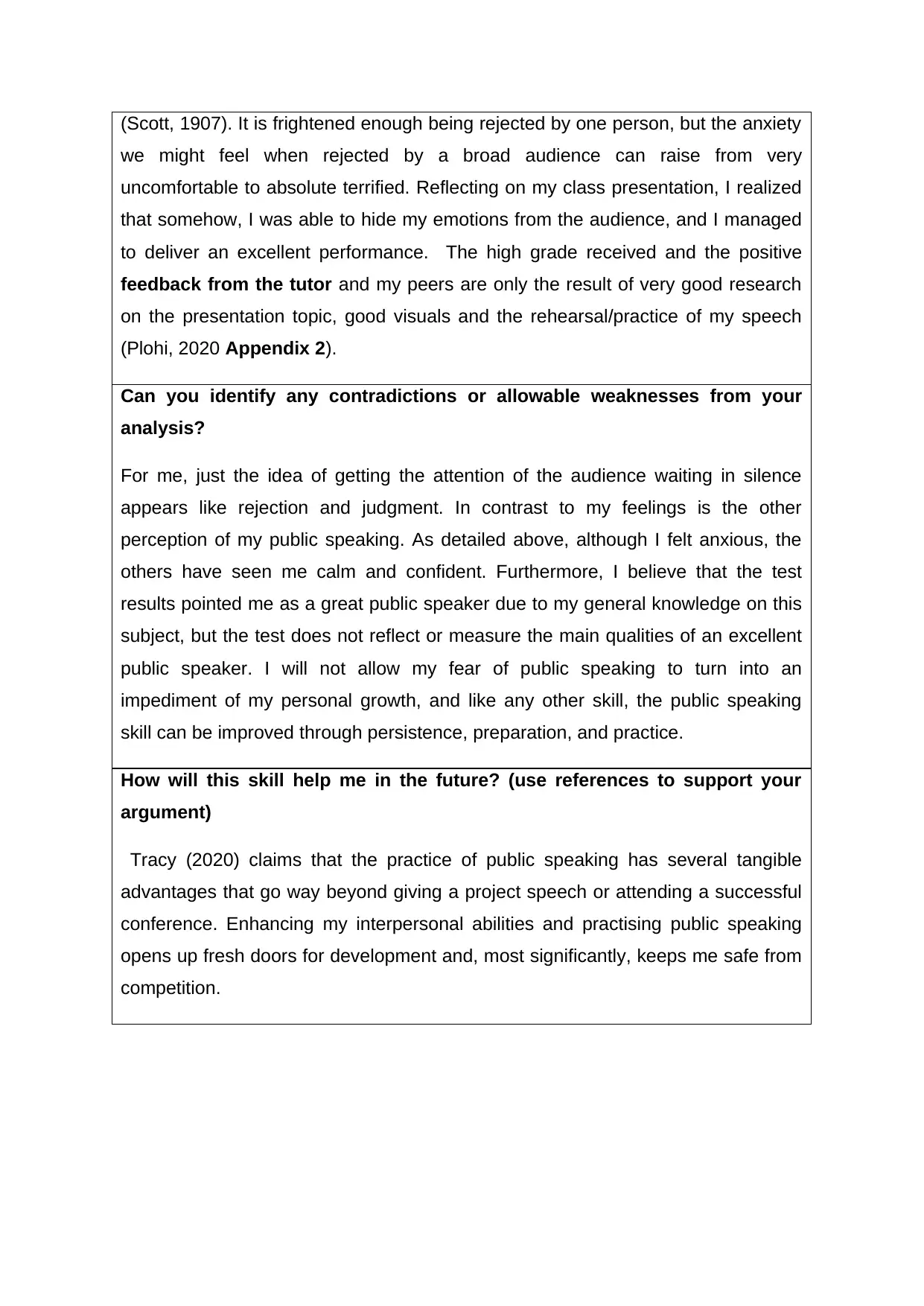
(Scott, 1907). It is frightened enough being rejected by one person, but the anxiety
we might feel when rejected by a broad audience can raise from very
uncomfortable to absolute terrified. Reflecting on my class presentation, I realized
that somehow, I was able to hide my emotions from the audience, and I managed
to deliver an excellent performance. The high grade received and the positive
feedback from the tutor and my peers are only the result of very good research
on the presentation topic, good visuals and the rehearsal/practice of my speech
(Plohi, 2020 Appendix 2).
Can you identify any contradictions or allowable weaknesses from your
analysis?
For me, just the idea of getting the attention of the audience waiting in silence
appears like rejection and judgment. In contrast to my feelings is the other
perception of my public speaking. As detailed above, although I felt anxious, the
others have seen me calm and confident. Furthermore, I believe that the test
results pointed me as a great public speaker due to my general knowledge on this
subject, but the test does not reflect or measure the main qualities of an excellent
public speaker. I will not allow my fear of public speaking to turn into an
impediment of my personal growth, and like any other skill, the public speaking
skill can be improved through persistence, preparation, and practice.
How will this skill help me in the future? (use references to support your
argument)
Tracy (2020) claims that the practice of public speaking has several tangible
advantages that go way beyond giving a project speech or attending a successful
conference. Enhancing my interpersonal abilities and practising public speaking
opens up fresh doors for development and, most significantly, keeps me safe from
competition.
we might feel when rejected by a broad audience can raise from very
uncomfortable to absolute terrified. Reflecting on my class presentation, I realized
that somehow, I was able to hide my emotions from the audience, and I managed
to deliver an excellent performance. The high grade received and the positive
feedback from the tutor and my peers are only the result of very good research
on the presentation topic, good visuals and the rehearsal/practice of my speech
(Plohi, 2020 Appendix 2).
Can you identify any contradictions or allowable weaknesses from your
analysis?
For me, just the idea of getting the attention of the audience waiting in silence
appears like rejection and judgment. In contrast to my feelings is the other
perception of my public speaking. As detailed above, although I felt anxious, the
others have seen me calm and confident. Furthermore, I believe that the test
results pointed me as a great public speaker due to my general knowledge on this
subject, but the test does not reflect or measure the main qualities of an excellent
public speaker. I will not allow my fear of public speaking to turn into an
impediment of my personal growth, and like any other skill, the public speaking
skill can be improved through persistence, preparation, and practice.
How will this skill help me in the future? (use references to support your
argument)
Tracy (2020) claims that the practice of public speaking has several tangible
advantages that go way beyond giving a project speech or attending a successful
conference. Enhancing my interpersonal abilities and practising public speaking
opens up fresh doors for development and, most significantly, keeps me safe from
competition.
⊘ This is a preview!⊘
Do you want full access?
Subscribe today to unlock all pages.

Trusted by 1+ million students worldwide
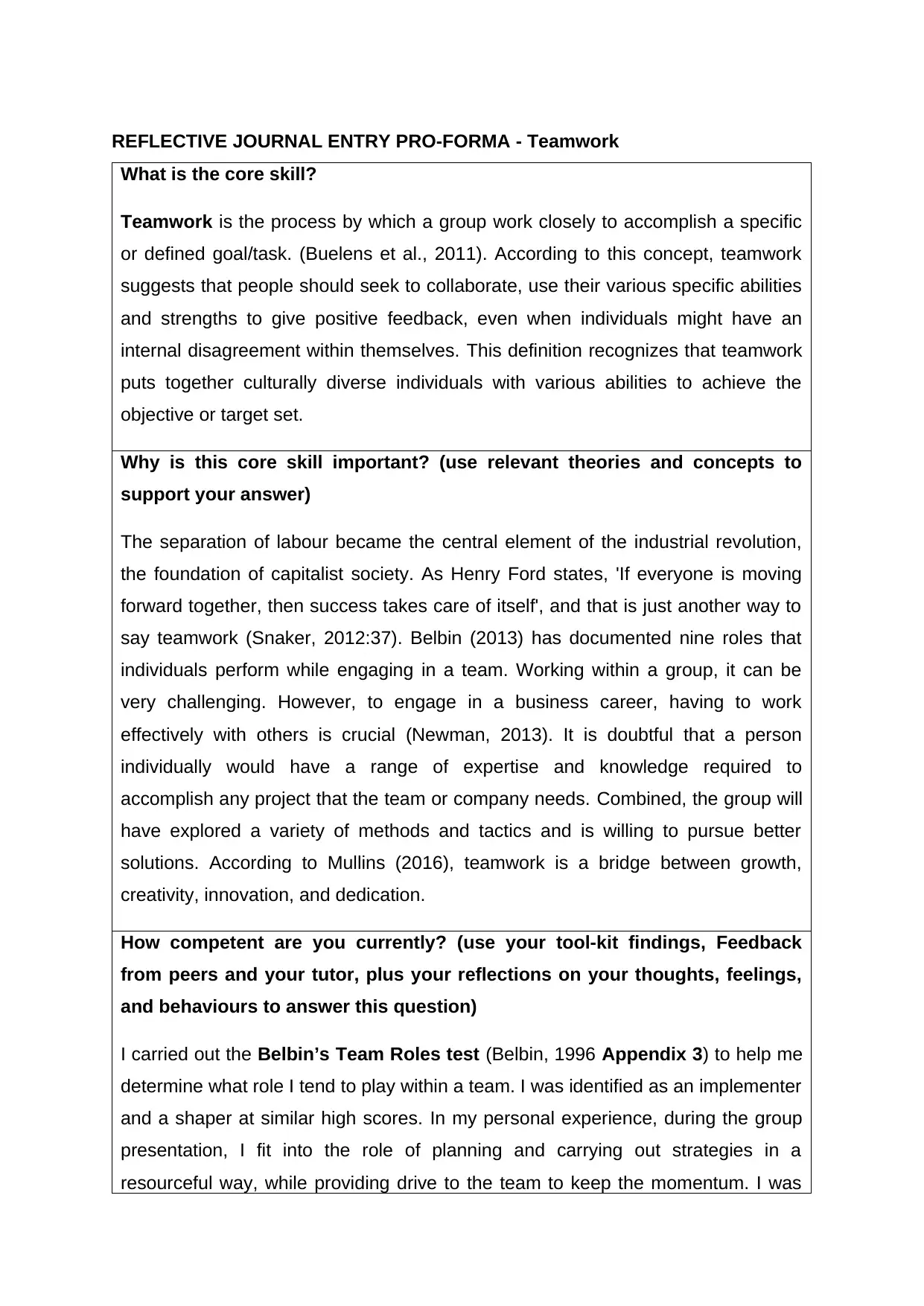
REFLECTIVE JOURNAL ENTRY PRO-FORMA - Teamwork
What is the core skill?
Teamwork is the process by which a group work closely to accomplish a specific
or defined goal/task. (Buelens et al., 2011). According to this concept, teamwork
suggests that people should seek to collaborate, use their various specific abilities
and strengths to give positive feedback, even when individuals might have an
internal disagreement within themselves. This definition recognizes that teamwork
puts together culturally diverse individuals with various abilities to achieve the
objective or target set.
Why is this core skill important? (use relevant theories and concepts to
support your answer)
The separation of labour became the central element of the industrial revolution,
the foundation of capitalist society. As Henry Ford states, 'If everyone is moving
forward together, then success takes care of itself', and that is just another way to
say teamwork (Snaker, 2012:37). Belbin (2013) has documented nine roles that
individuals perform while engaging in a team. Working within a group, it can be
very challenging. However, to engage in a business career, having to work
effectively with others is crucial (Newman, 2013). It is doubtful that a person
individually would have a range of expertise and knowledge required to
accomplish any project that the team or company needs. Combined, the group will
have explored a variety of methods and tactics and is willing to pursue better
solutions. According to Mullins (2016), teamwork is a bridge between growth,
creativity, innovation, and dedication.
How competent are you currently? (use your tool-kit findings, Feedback
from peers and your tutor, plus your reflections on your thoughts, feelings,
and behaviours to answer this question)
I carried out the Belbin’s Team Roles test (Belbin, 1996 Appendix 3) to help me
determine what role I tend to play within a team. I was identified as an implementer
and a shaper at similar high scores. In my personal experience, during the group
presentation, I fit into the role of planning and carrying out strategies in a
resourceful way, while providing drive to the team to keep the momentum. I was
What is the core skill?
Teamwork is the process by which a group work closely to accomplish a specific
or defined goal/task. (Buelens et al., 2011). According to this concept, teamwork
suggests that people should seek to collaborate, use their various specific abilities
and strengths to give positive feedback, even when individuals might have an
internal disagreement within themselves. This definition recognizes that teamwork
puts together culturally diverse individuals with various abilities to achieve the
objective or target set.
Why is this core skill important? (use relevant theories and concepts to
support your answer)
The separation of labour became the central element of the industrial revolution,
the foundation of capitalist society. As Henry Ford states, 'If everyone is moving
forward together, then success takes care of itself', and that is just another way to
say teamwork (Snaker, 2012:37). Belbin (2013) has documented nine roles that
individuals perform while engaging in a team. Working within a group, it can be
very challenging. However, to engage in a business career, having to work
effectively with others is crucial (Newman, 2013). It is doubtful that a person
individually would have a range of expertise and knowledge required to
accomplish any project that the team or company needs. Combined, the group will
have explored a variety of methods and tactics and is willing to pursue better
solutions. According to Mullins (2016), teamwork is a bridge between growth,
creativity, innovation, and dedication.
How competent are you currently? (use your tool-kit findings, Feedback
from peers and your tutor, plus your reflections on your thoughts, feelings,
and behaviours to answer this question)
I carried out the Belbin’s Team Roles test (Belbin, 1996 Appendix 3) to help me
determine what role I tend to play within a team. I was identified as an implementer
and a shaper at similar high scores. In my personal experience, during the group
presentation, I fit into the role of planning and carrying out strategies in a
resourceful way, while providing drive to the team to keep the momentum. I was
Paraphrase This Document
Need a fresh take? Get an instant paraphrase of this document with our AI Paraphraser
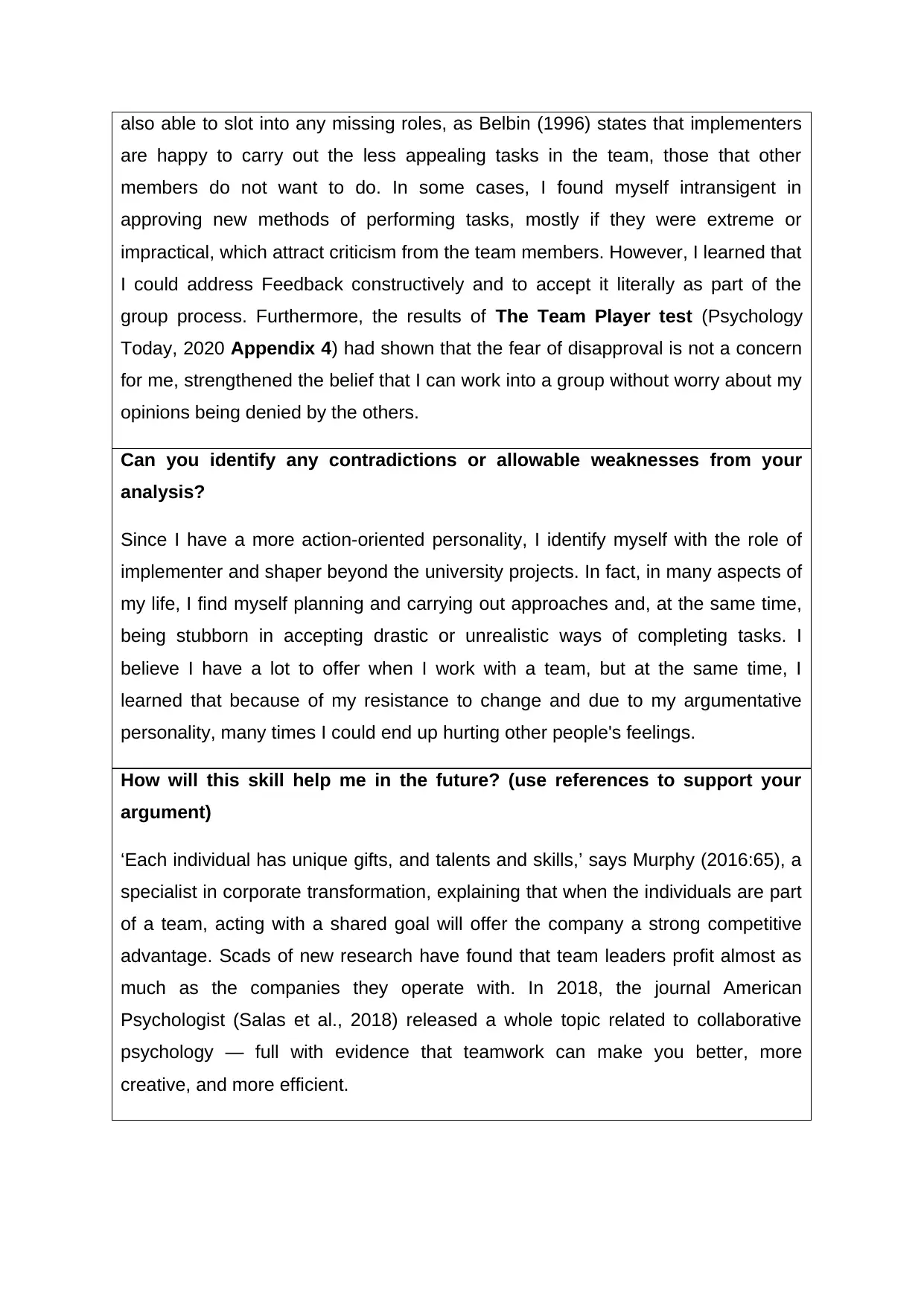
also able to slot into any missing roles, as Belbin (1996) states that implementers
are happy to carry out the less appealing tasks in the team, those that other
members do not want to do. In some cases, I found myself intransigent in
approving new methods of performing tasks, mostly if they were extreme or
impractical, which attract criticism from the team members. However, I learned that
I could address Feedback constructively and to accept it literally as part of the
group process. Furthermore, the results of The Team Player test (Psychology
Today, 2020 Appendix 4) had shown that the fear of disapproval is not a concern
for me, strengthened the belief that I can work into a group without worry about my
opinions being denied by the others.
Can you identify any contradictions or allowable weaknesses from your
analysis?
Since I have a more action-oriented personality, I identify myself with the role of
implementer and shaper beyond the university projects. In fact, in many aspects of
my life, I find myself planning and carrying out approaches and, at the same time,
being stubborn in accepting drastic or unrealistic ways of completing tasks. I
believe I have a lot to offer when I work with a team, but at the same time, I
learned that because of my resistance to change and due to my argumentative
personality, many times I could end up hurting other people's feelings.
How will this skill help me in the future? (use references to support your
argument)
‘Each individual has unique gifts, and talents and skills,’ says Murphy (2016:65), a
specialist in corporate transformation, explaining that when the individuals are part
of a team, acting with a shared goal will offer the company a strong competitive
advantage. Scads of new research have found that team leaders profit almost as
much as the companies they operate with. In 2018, the journal American
Psychologist (Salas et al., 2018) released a whole topic related to collaborative
psychology — full with evidence that teamwork can make you better, more
creative, and more efficient.
are happy to carry out the less appealing tasks in the team, those that other
members do not want to do. In some cases, I found myself intransigent in
approving new methods of performing tasks, mostly if they were extreme or
impractical, which attract criticism from the team members. However, I learned that
I could address Feedback constructively and to accept it literally as part of the
group process. Furthermore, the results of The Team Player test (Psychology
Today, 2020 Appendix 4) had shown that the fear of disapproval is not a concern
for me, strengthened the belief that I can work into a group without worry about my
opinions being denied by the others.
Can you identify any contradictions or allowable weaknesses from your
analysis?
Since I have a more action-oriented personality, I identify myself with the role of
implementer and shaper beyond the university projects. In fact, in many aspects of
my life, I find myself planning and carrying out approaches and, at the same time,
being stubborn in accepting drastic or unrealistic ways of completing tasks. I
believe I have a lot to offer when I work with a team, but at the same time, I
learned that because of my resistance to change and due to my argumentative
personality, many times I could end up hurting other people's feelings.
How will this skill help me in the future? (use references to support your
argument)
‘Each individual has unique gifts, and talents and skills,’ says Murphy (2016:65), a
specialist in corporate transformation, explaining that when the individuals are part
of a team, acting with a shared goal will offer the company a strong competitive
advantage. Scads of new research have found that team leaders profit almost as
much as the companies they operate with. In 2018, the journal American
Psychologist (Salas et al., 2018) released a whole topic related to collaborative
psychology — full with evidence that teamwork can make you better, more
creative, and more efficient.
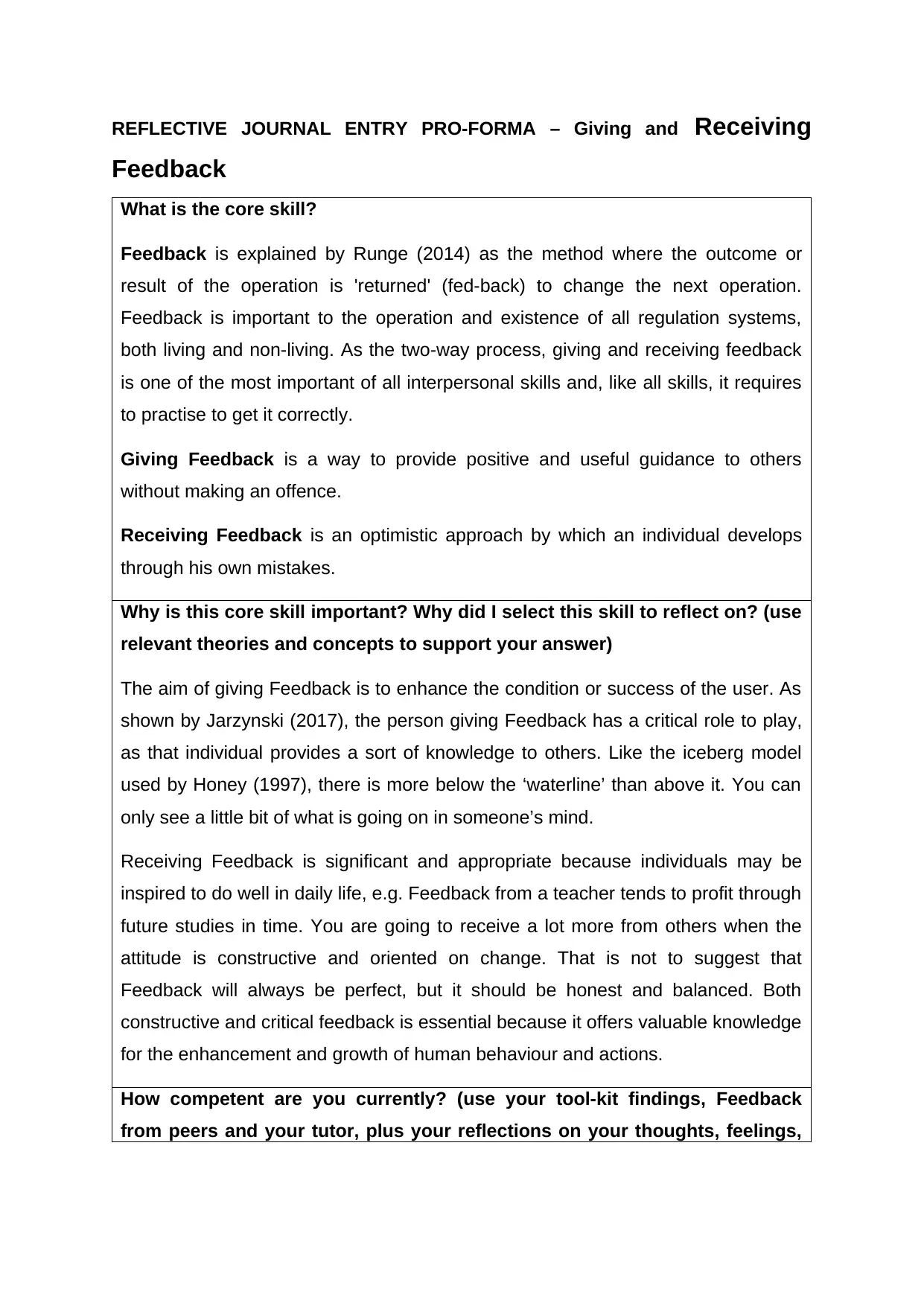
REFLECTIVE JOURNAL ENTRY PRO-FORMA – Giving and Receiving
Feedback
What is the core skill?
Feedback is explained by Runge (2014) as the method where the outcome or
result of the operation is 'returned' (fed-back) to change the next operation.
Feedback is important to the operation and existence of all regulation systems,
both living and non-living. As the two-way process, giving and receiving feedback
is one of the most important of all interpersonal skills and, like all skills, it requires
to practise to get it correctly.
Giving Feedback is a way to provide positive and useful guidance to others
without making an offence.
Receiving Feedback is an optimistic approach by which an individual develops
through his own mistakes.
Why is this core skill important? Why did I select this skill to reflect on? (use
relevant theories and concepts to support your answer)
The aim of giving Feedback is to enhance the condition or success of the user. As
shown by Jarzynski (2017), the person giving Feedback has a critical role to play,
as that individual provides a sort of knowledge to others. Like the iceberg model
used by Honey (1997), there is more below the ‘waterline’ than above it. You can
only see a little bit of what is going on in someone’s mind.
Receiving Feedback is significant and appropriate because individuals may be
inspired to do well in daily life, e.g. Feedback from a teacher tends to profit through
future studies in time. You are going to receive a lot more from others when the
attitude is constructive and oriented on change. That is not to suggest that
Feedback will always be perfect, but it should be honest and balanced. Both
constructive and critical feedback is essential because it offers valuable knowledge
for the enhancement and growth of human behaviour and actions.
How competent are you currently? (use your tool-kit findings, Feedback
from peers and your tutor, plus your reflections on your thoughts, feelings,
Feedback
What is the core skill?
Feedback is explained by Runge (2014) as the method where the outcome or
result of the operation is 'returned' (fed-back) to change the next operation.
Feedback is important to the operation and existence of all regulation systems,
both living and non-living. As the two-way process, giving and receiving feedback
is one of the most important of all interpersonal skills and, like all skills, it requires
to practise to get it correctly.
Giving Feedback is a way to provide positive and useful guidance to others
without making an offence.
Receiving Feedback is an optimistic approach by which an individual develops
through his own mistakes.
Why is this core skill important? Why did I select this skill to reflect on? (use
relevant theories and concepts to support your answer)
The aim of giving Feedback is to enhance the condition or success of the user. As
shown by Jarzynski (2017), the person giving Feedback has a critical role to play,
as that individual provides a sort of knowledge to others. Like the iceberg model
used by Honey (1997), there is more below the ‘waterline’ than above it. You can
only see a little bit of what is going on in someone’s mind.
Receiving Feedback is significant and appropriate because individuals may be
inspired to do well in daily life, e.g. Feedback from a teacher tends to profit through
future studies in time. You are going to receive a lot more from others when the
attitude is constructive and oriented on change. That is not to suggest that
Feedback will always be perfect, but it should be honest and balanced. Both
constructive and critical feedback is essential because it offers valuable knowledge
for the enhancement and growth of human behaviour and actions.
How competent are you currently? (use your tool-kit findings, Feedback
from peers and your tutor, plus your reflections on your thoughts, feelings,
⊘ This is a preview!⊘
Do you want full access?
Subscribe today to unlock all pages.

Trusted by 1+ million students worldwide
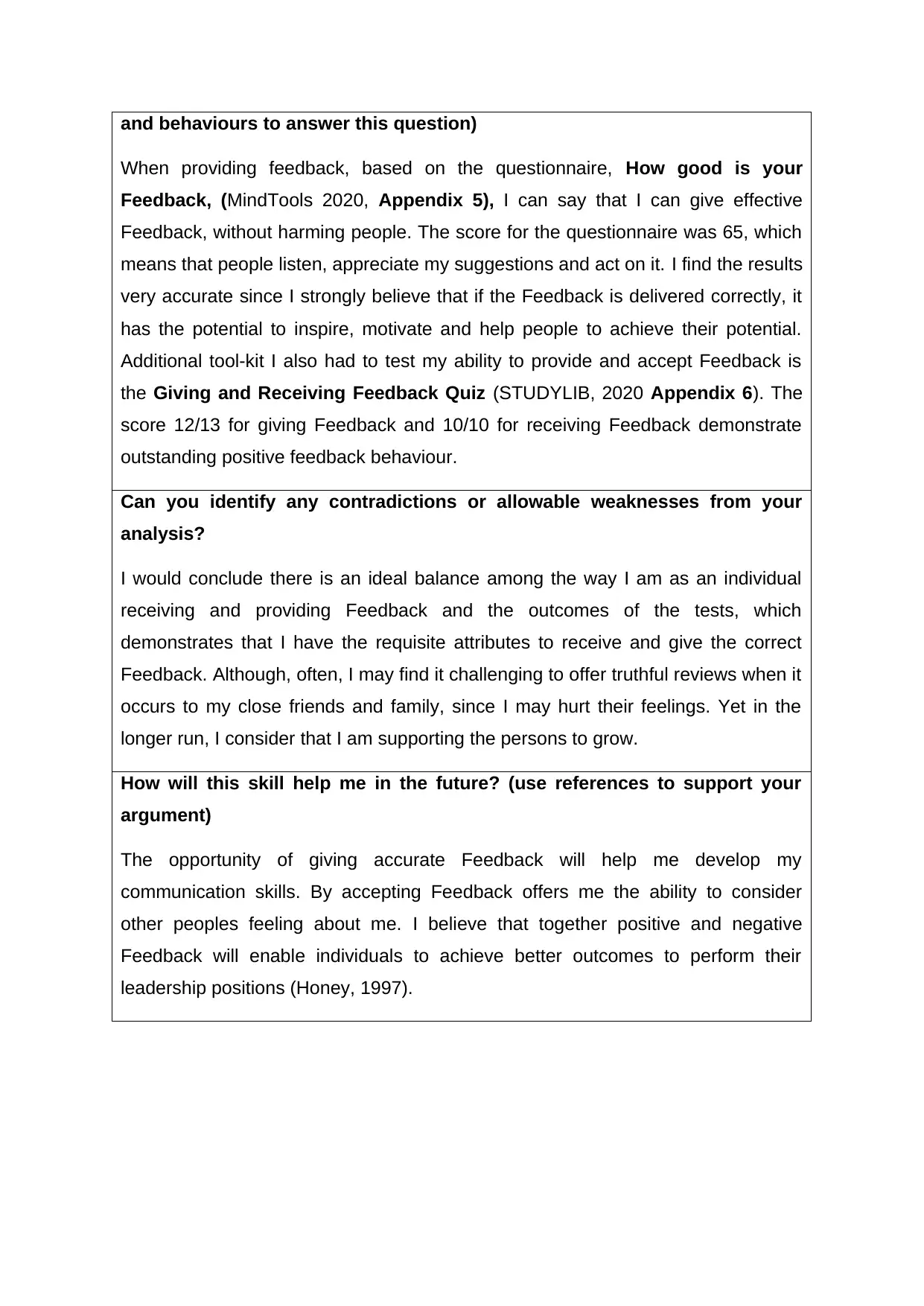
and behaviours to answer this question)
When providing feedback, based on the questionnaire, How good is your
Feedback, (MindTools 2020, Appendix 5), I can say that I can give effective
Feedback, without harming people. The score for the questionnaire was 65, which
means that people listen, appreciate my suggestions and act on it. I find the results
very accurate since I strongly believe that if the Feedback is delivered correctly, it
has the potential to inspire, motivate and help people to achieve their potential.
Additional tool-kit I also had to test my ability to provide and accept Feedback is
the Giving and Receiving Feedback Quiz (STUDYLIB, 2020 Appendix 6). The
score 12/13 for giving Feedback and 10/10 for receiving Feedback demonstrate
outstanding positive feedback behaviour.
Can you identify any contradictions or allowable weaknesses from your
analysis?
I would conclude there is an ideal balance among the way I am as an individual
receiving and providing Feedback and the outcomes of the tests, which
demonstrates that I have the requisite attributes to receive and give the correct
Feedback. Although, often, I may find it challenging to offer truthful reviews when it
occurs to my close friends and family, since I may hurt their feelings. Yet in the
longer run, I consider that I am supporting the persons to grow.
How will this skill help me in the future? (use references to support your
argument)
The opportunity of giving accurate Feedback will help me develop my
communication skills. By accepting Feedback offers me the ability to consider
other peoples feeling about me. I believe that together positive and negative
Feedback will enable individuals to achieve better outcomes to perform their
leadership positions (Honey, 1997).
When providing feedback, based on the questionnaire, How good is your
Feedback, (MindTools 2020, Appendix 5), I can say that I can give effective
Feedback, without harming people. The score for the questionnaire was 65, which
means that people listen, appreciate my suggestions and act on it. I find the results
very accurate since I strongly believe that if the Feedback is delivered correctly, it
has the potential to inspire, motivate and help people to achieve their potential.
Additional tool-kit I also had to test my ability to provide and accept Feedback is
the Giving and Receiving Feedback Quiz (STUDYLIB, 2020 Appendix 6). The
score 12/13 for giving Feedback and 10/10 for receiving Feedback demonstrate
outstanding positive feedback behaviour.
Can you identify any contradictions or allowable weaknesses from your
analysis?
I would conclude there is an ideal balance among the way I am as an individual
receiving and providing Feedback and the outcomes of the tests, which
demonstrates that I have the requisite attributes to receive and give the correct
Feedback. Although, often, I may find it challenging to offer truthful reviews when it
occurs to my close friends and family, since I may hurt their feelings. Yet in the
longer run, I consider that I am supporting the persons to grow.
How will this skill help me in the future? (use references to support your
argument)
The opportunity of giving accurate Feedback will help me develop my
communication skills. By accepting Feedback offers me the ability to consider
other peoples feeling about me. I believe that together positive and negative
Feedback will enable individuals to achieve better outcomes to perform their
leadership positions (Honey, 1997).
Paraphrase This Document
Need a fresh take? Get an instant paraphrase of this document with our AI Paraphraser
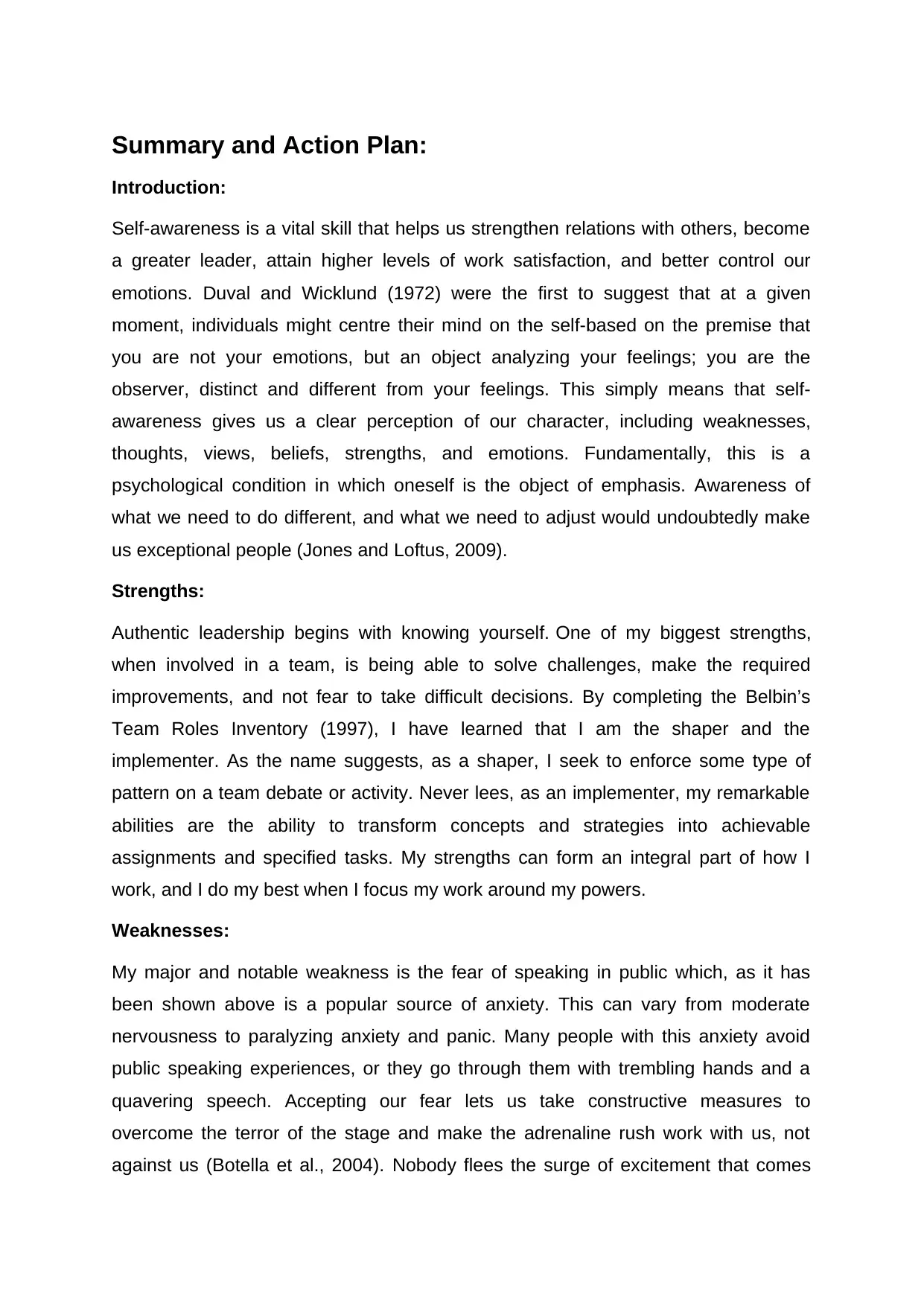
Summary and Action Plan:
Introduction:
Self-awareness is a vital skill that helps us strengthen relations with others, become
a greater leader, attain higher levels of work satisfaction, and better control our
emotions. Duval and Wicklund (1972) were the first to suggest that at a given
moment, individuals might centre their mind on the self-based on the premise that
you are not your emotions, but an object analyzing your feelings; you are the
observer, distinct and different from your feelings. This simply means that self-
awareness gives us a clear perception of our character, including weaknesses,
thoughts, views, beliefs, strengths, and emotions. Fundamentally, this is a
psychological condition in which oneself is the object of emphasis. Awareness of
what we need to do different, and what we need to adjust would undoubtedly make
us exceptional people (Jones and Loftus, 2009).
Strengths:
Authentic leadership begins with knowing yourself. One of my biggest strengths,
when involved in a team, is being able to solve challenges, make the required
improvements, and not fear to take difficult decisions. By completing the Belbin’s
Team Roles Inventory (1997), I have learned that I am the shaper and the
implementer. As the name suggests, as a shaper, I seek to enforce some type of
pattern on a team debate or activity. Never lees, as an implementer, my remarkable
abilities are the ability to transform concepts and strategies into achievable
assignments and specified tasks. My strengths can form an integral part of how I
work, and I do my best when I focus my work around my powers.
Weaknesses:
My major and notable weakness is the fear of speaking in public which, as it has
been shown above is a popular source of anxiety. This can vary from moderate
nervousness to paralyzing anxiety and panic. Many people with this anxiety avoid
public speaking experiences, or they go through them with trembling hands and a
quavering speech. Accepting our fear lets us take constructive measures to
overcome the terror of the stage and make the adrenaline rush work with us, not
against us (Botella et al., 2004). Nobody flees the surge of excitement that comes
Introduction:
Self-awareness is a vital skill that helps us strengthen relations with others, become
a greater leader, attain higher levels of work satisfaction, and better control our
emotions. Duval and Wicklund (1972) were the first to suggest that at a given
moment, individuals might centre their mind on the self-based on the premise that
you are not your emotions, but an object analyzing your feelings; you are the
observer, distinct and different from your feelings. This simply means that self-
awareness gives us a clear perception of our character, including weaknesses,
thoughts, views, beliefs, strengths, and emotions. Fundamentally, this is a
psychological condition in which oneself is the object of emphasis. Awareness of
what we need to do different, and what we need to adjust would undoubtedly make
us exceptional people (Jones and Loftus, 2009).
Strengths:
Authentic leadership begins with knowing yourself. One of my biggest strengths,
when involved in a team, is being able to solve challenges, make the required
improvements, and not fear to take difficult decisions. By completing the Belbin’s
Team Roles Inventory (1997), I have learned that I am the shaper and the
implementer. As the name suggests, as a shaper, I seek to enforce some type of
pattern on a team debate or activity. Never lees, as an implementer, my remarkable
abilities are the ability to transform concepts and strategies into achievable
assignments and specified tasks. My strengths can form an integral part of how I
work, and I do my best when I focus my work around my powers.
Weaknesses:
My major and notable weakness is the fear of speaking in public which, as it has
been shown above is a popular source of anxiety. This can vary from moderate
nervousness to paralyzing anxiety and panic. Many people with this anxiety avoid
public speaking experiences, or they go through them with trembling hands and a
quavering speech. Accepting our fear lets us take constructive measures to
overcome the terror of the stage and make the adrenaline rush work with us, not
against us (Botella et al., 2004). Nobody flees the surge of excitement that comes
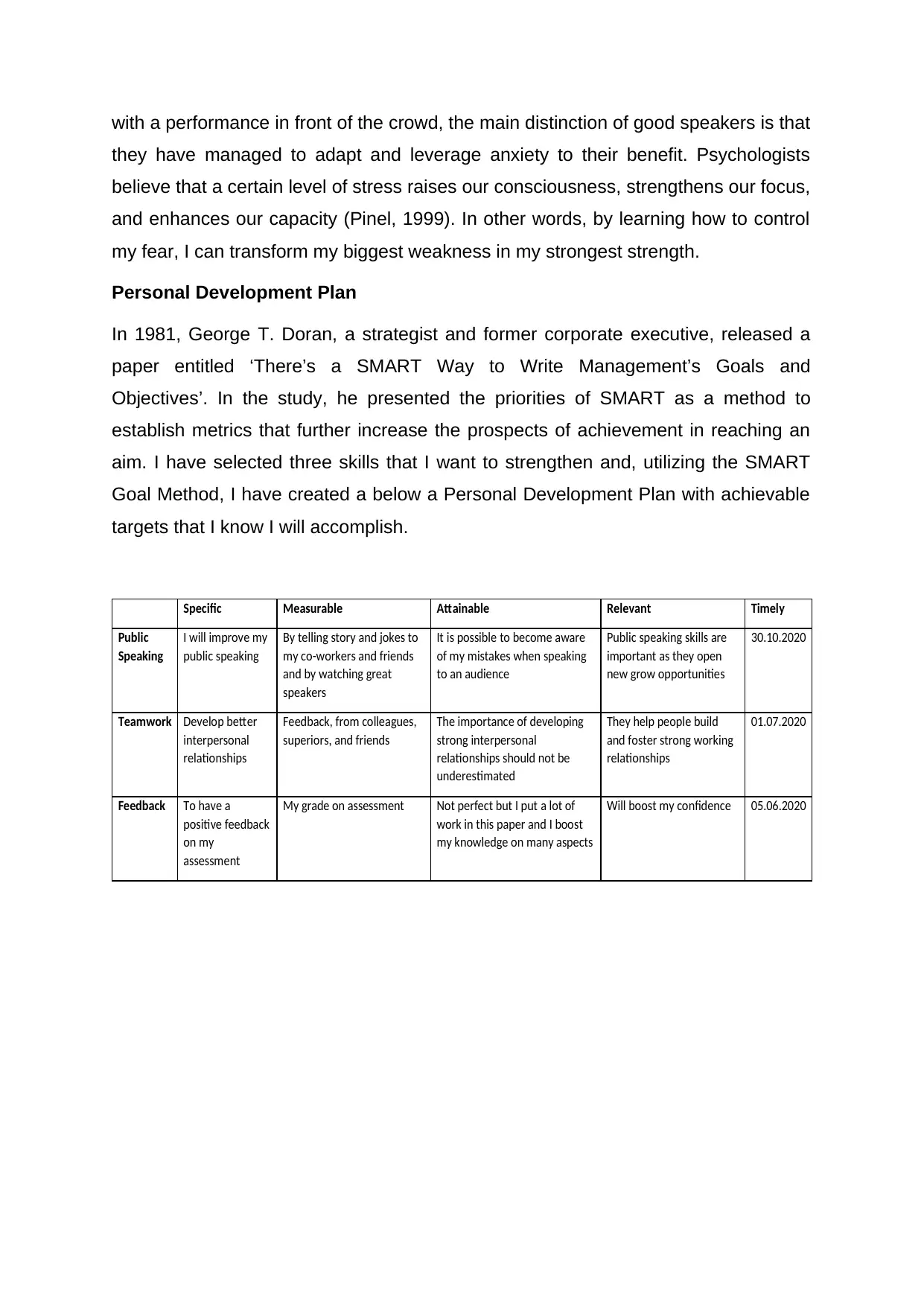
with a performance in front of the crowd, the main distinction of good speakers is that
they have managed to adapt and leverage anxiety to their benefit. Psychologists
believe that a certain level of stress raises our consciousness, strengthens our focus,
and enhances our capacity (Pinel, 1999). In other words, by learning how to control
my fear, I can transform my biggest weakness in my strongest strength.
Personal Development Plan
In 1981, George T. Doran, a strategist and former corporate executive, released a
paper entitled ‘There’s a SMART Way to Write Management’s Goals and
Objectives’. In the study, he presented the priorities of SMART as a method to
establish metrics that further increase the prospects of achievement in reaching an
aim. I have selected three skills that I want to strengthen and, utilizing the SMART
Goal Method, I have created a below a Personal Development Plan with achievable
targets that I know I will accomplish.
Specific Measurable Attainable Relevant Timely
Public
Speaking
I will improve my
public speaking
By telling story and jokes to
my co-workers and friends
and by watching great
speakers
It is possible to become aware
of my mistakes when speaking
to an audience
Public speaking skills are
important as they open
new grow opportunities
30.10.2020
Teamwork Develop better
interpersonal
relationships
Feedback, from colleagues,
superiors, and friends
The importance of developing
strong interpersonal
relationships should not be
underestimated
They help people build
and foster strong working
relationships
01.07.2020
Feedback To have a
positive feedback
on my
assessment
My grade on assessment Not perfect but I put a lot of
work in this paper and I boost
my knowledge on many aspects
Will boost my confidence 05.06.2020
they have managed to adapt and leverage anxiety to their benefit. Psychologists
believe that a certain level of stress raises our consciousness, strengthens our focus,
and enhances our capacity (Pinel, 1999). In other words, by learning how to control
my fear, I can transform my biggest weakness in my strongest strength.
Personal Development Plan
In 1981, George T. Doran, a strategist and former corporate executive, released a
paper entitled ‘There’s a SMART Way to Write Management’s Goals and
Objectives’. In the study, he presented the priorities of SMART as a method to
establish metrics that further increase the prospects of achievement in reaching an
aim. I have selected three skills that I want to strengthen and, utilizing the SMART
Goal Method, I have created a below a Personal Development Plan with achievable
targets that I know I will accomplish.
Specific Measurable Attainable Relevant Timely
Public
Speaking
I will improve my
public speaking
By telling story and jokes to
my co-workers and friends
and by watching great
speakers
It is possible to become aware
of my mistakes when speaking
to an audience
Public speaking skills are
important as they open
new grow opportunities
30.10.2020
Teamwork Develop better
interpersonal
relationships
Feedback, from colleagues,
superiors, and friends
The importance of developing
strong interpersonal
relationships should not be
underestimated
They help people build
and foster strong working
relationships
01.07.2020
Feedback To have a
positive feedback
on my
assessment
My grade on assessment Not perfect but I put a lot of
work in this paper and I boost
my knowledge on many aspects
Will boost my confidence 05.06.2020
⊘ This is a preview!⊘
Do you want full access?
Subscribe today to unlock all pages.

Trusted by 1+ million students worldwide
1 out of 21
Related Documents
Your All-in-One AI-Powered Toolkit for Academic Success.
+13062052269
info@desklib.com
Available 24*7 on WhatsApp / Email
![[object Object]](/_next/static/media/star-bottom.7253800d.svg)
Unlock your academic potential
Copyright © 2020–2026 A2Z Services. All Rights Reserved. Developed and managed by ZUCOL.





